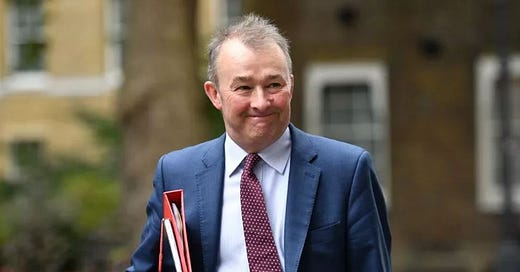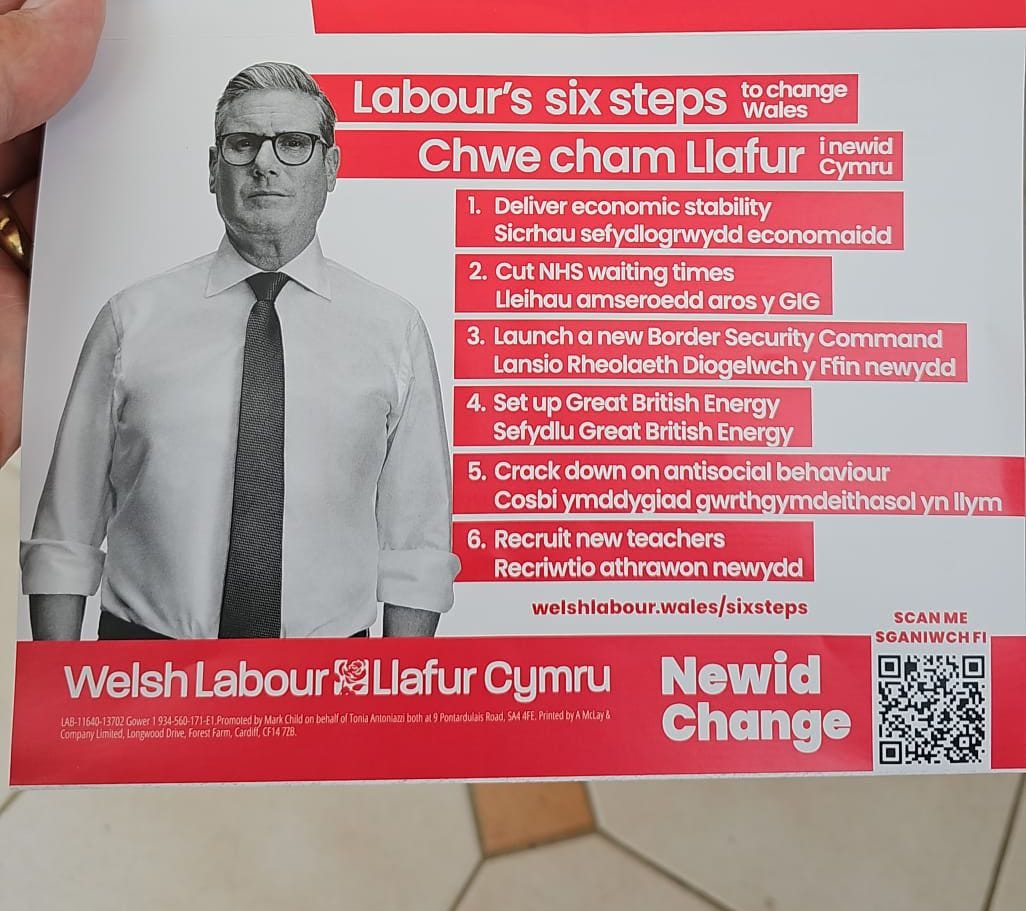Hi all,
Thanks for the messages after the last newsletter.
The story about a school that was accused of teaching creationism (which was first broken exclusively in this newsletter) has been picked in lots of places and has triggered an investigation into teaching practices in the school.
This week will be a whistle stop tour around several interesting stories finishing with a deep dive into whether Plaid Cymru could lead the Welsh Government come 2026.
Labour being disingenuous
These pictures show a leaflet that the Labour Party were delivering in Monmouthshire the day the postal votes went out voters.
They show pledges to reduce waiting times in the Welsh NHS, recruit new teachers and clean up the rivers. All three of these things are devolved and have been well within the gift of the party’s representatives in Cardiff Bay to solve for decades.
A cyclical person might suggest they are hoping people’s naivety to devolution would mean that they overlook this fact.
Wales a Tory free zone?
There are now polls regularly suggesting we could be seeing a Conservative wipeout in Wales. This would mean that four men who have held the role of secretary of state for Wales will be losing their seat - Alun Cairns, Stephen Crabb, Simon Hart (who is currently chief whip) and the current person in that role David TC Davies.
The safest seat for them was Craig Williams who is running in Montgomeryshire and Glyndŵr. However he is no longer a safe bet for them because, well, he made a safe bet. You will probably have seen by now that three days before the election date was announced Mr Williams, who is Sunak’s right hand man, placed a £100 bet on the date of the election.
This is currently being investigated and it is clear from comments made by people within the cabinet and the Prime Minister that the party has no interest in supporting him. If he is found to have transgressed it is very possible there would be a recall petition even if he was to win the seat. Meaning a rump Tory Party could be fighting a by-election straight after the General.
There are two Welsh Tory MPs who I think defy the polls. I am not saying they will keep their seats, but I reckon they will outperform the UK average for the party. These are Virginia Crosbie in Anglesey and David TC Davies in Monmouth.
There are reasons to be critical of both of them (and I regularly have in this newsletter), but you can’t really argue that they are not very active in their constituencies and have cultivated a significant personal following which may motivate their base to get out and vote more than in other parts of the country.
What chance do the Greens have in Wales?
I recently wrote this analysis for WalesOnline having attended the Wales Green Party manifesto launch (don’t worry, I cycled there).
Though they acknowledge that there is no chance of them winning any Welsh seats in the General Election, their leader Anthony Slaughter (amazing name) is absolutely convinced that in an expanded Senedd in 2026 they will have between one and three members.
This would be a really big deal for them beyond the legitimising kudos that comes with having seats. It also gives them staff and resources that enable them to raise their profile over the next five years. This is massive, when you have people within the party who are there because it is their job rather than in addition to their job it makes spreading your message so much easier.
I think the Greens are right in their hopes. I can see a situation where Plaid and the Greens have an electoral pact in 2026 (they did something similar in Cardiff during the 2022 council elections). Two pro indy parties running against each other in Wales doesn’t seem a productive way to increase your representation.
Plaid Cymru to be the largest party in Wales in the 2026 Senedd election?
There is a growing chance that Plaid Cymru will be the largest party at the Senedd election in 2026. Or at the very least the will out perform their best ever result that they got in 1999 when they got just under a third of the vote.
Wait, wait, hear me out here. I know that for decades, whenever an election is upcoming, people far cleverer than me have said that Plaid Cymru is on the verge of a breakthrough. Then the election rolls around and the same thing happens – they do well in Welsh-speaking heartlands and fail to cut it in a meaningful way elsewhere. And so the stagnation continues.
However, there is good evidence to suggest 2026 will be different.
Well, perhaps that is the wrong way to look at it. It is more a case of “if they can’t win this time, when can they?”
Because this time around there are very good reasons to think this is Plaid’s best chance to be Wales’ largest party – at least in the Senedd. There are several reasons for this:
The opposition
Let’s look at what Plaid will be up against in 2026, starting with Labour.
It is likely that by 2026 Labour will have been in power in Westminster for two years. Even if somehow they don’t win a majority in the Commons, there is no way they are not leading the government because no-one will go into coalition with the Tories.
Given the current state of the economy and public services, plus UK Labour’s refusal to guarantee any meaningful extra money for Wales, it is hard to imagine a Welsh Labour government in Cardiff will be popular. Welsh Labour will also have nowhere to hide when it comes to the issues of public services in Wales, as they will not only have managed them for more than 20 years but they can no longer point down the M4 and say it’s “the Tories’ fault”.
On top of this, Welsh Labour are seemingly increasingly less Welsh and more British in their outlook. When Yvette Cooper and Jo Stevens both ruled out devolving policing or justice, there wasn’t a peep from the Welsh Labour leadership despite it being a key component of both Vaughan Gething and Jeremy Miles’ leadership bids.
Plus, there is a chance, though admittedly fairly slim, that Mr Gething will still be Welsh Labour leader in 2026. His polling numbers are dire. He is now below Andrew RT Davies, who himself has been leading the Welsh Tories as if he would like nothing more than to stay in perpetual opposition. If you want to know what it is like when the governing party stumbles into an election with an unpopular leader, just look at Rishi Sunak’s poll numbers.
But even if they do change leader, Labour is still likely to be a bitterly divided party. Even if Mr Miles runs again and wins, there will be clear fault lines. I have spoken to people from both the Miles and Gething camps who say that there will be a contest if the current First Minister steps down. Gething supporters are furious with what they perceive as Miles’ lack of support for Mr Gething following the election.
So Plaid will be up against an unpopular and divided Welsh Labour who have little money and fewer excuses.
The Tory brand will likely still be in the gutter and if Andrew RT Davies is still “leading” the party in 2026, they are unlikely to be able to muster any real opposition.
Then we have the likes of Abolish the Assembly and Reform, who may do well but the Venn diagram of people who switch between Plaid and Abolish is basically two separate circles.
The Greens could feasibly eat into the Plaid vote given that they also advocate independence and are socially progressive but without the language element which has the potential to put off older or monolingual voters (this isn’t common any more in my opinion).
But as I said above Plaid and the Greens could also make a pact to prevent this happening.
Leader
Rhun ap Iorwerth is, above all, a pragmatist. He isn’t the dreamer that Adam Price was. He said immediately upon taking over as leader last year that this General Election was going to be “tough” and has indicated that the best-case scenario is that Plaid take Ynys Mon.
But he has come across well in the leadership debates and has gained a larger profile within Cymru, though not quite yet to the same degree that Leanne Wood did a decade ago.
His background is in broadcast journalism and he is a decent performer in front of the camera. He is good at resonating with the base of the party and yet is also adept at speaking to those who are not predisposed to agree with him.
He also appears to have the Mark Drakeford trait of showing attention to detail. He previously held the health brief within the party during the pandemic and I must say he was quite impressive during scrutiny committees in terms of the level of detail he went into.
Perhaps the biggest policy change that Mr ap Iorwerth has overseen has been to move the issue of Welsh indy away from the forefront of the conversations. Yes, they still talk about independence, they advocate for it, but it appears Plaid Cymru is now less about making the case for independence than about making the case for Plaid Cymru. This makes it so much easier for them to convert new voters.
The challenges
As always, one of the biggest challenges for Plaid is resources. Labour and the Tories always go into elections with more money and more staff. Plaid are simply not going to be able to compete with the level of advertising that their opponents can put out, especially outside the areas where they traditionally win.
But at least the party is now, seemingly, more united. It is easy to forget how bad things were just over a year ago when Mr Price stepped down following the revelations that the party had “failed to have zero tolerance to sexual harassment”. Party morale was in the toilet. The leadership will be hoping that motivated boots on the ground will offset the resource imbalance.
Of course this isn’t going to be an easy task. But turnout in Senedd elections is always lower and this means you don’t have to convince as many people for it to have a big impact in terms of seats. Plaid has shown they have politicians who can win in areas like the Valleys. People like Luke Fletcher, a lad from Pencoed who has made himself a well-known local figure by getting out and speaking to people.
And lastly, a new job for former Tory Matthew MacKinnon
The younger man in the middle of the picture below is Matthew Mackinnon. As you can see he loves a passionate fist pump.
He first came to my attention about six years ago when he ran the right wing think tank the Centre for Welsh Studies.
This think tank had quite a few well known names on its board of advisors inc: former sec of state for Wales David Jones, Vale of Clwyd MP James Davies and MP Sarah Atherton. The way the think tank was funded was very opaque.
An investigation a few years back showed how the think tank was directly linked to pumping out climate change denial on Facebook. I wrote a Twitter thread on this back in the day which you can read here.
Mr Mackinnon is also a former football hooligan, who was among five Swansea City fans banned from grounds across the UK after admitting they had caused or contributed to violence and disorder at matches - although this was 12 years ago when he was just 20. You can read the full story here.
At the time he stood as a council candidate for the Tories in 2022, he said that his football banning order had come at a low point in his life when his mum was extremely ill and he was “associated with individuals that I shouldn’t have been and was given a pre-emptive ban as I was made guilty by association”.
Interestingly, it appears that Mr Mackinnon is no longer supporting the Tories as he is working doing communications for Nigel Farage at Reform.
That is all for this week. As always please share with people you think will be interested.
Take care
Will








